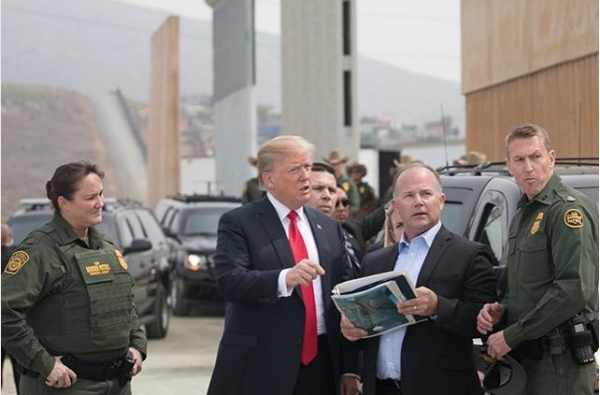Trump unhappy with border wall deal
February 14, 2019 | Expert Insights

Trump unhappy with border wall deal
Unfazed by a congressional deal giving him only $1.3 billion for a barrier on the US-Mexico border, President Donald Trump is saying that he has found twenty times as much for overall border security “from other sources.”
Background
The Mexico–United States barrier, sometimes colloquially called the Border Wall, is a series of vertical barriers along the Mexico–United States border aimed at preventing illegal crossings from Mexico into the United States. The barrier is not one contiguous structure, but a discontinuous series of physical obstructions variously classified as "fences" or "walls".
Throughout his 2016 presidential campaign, Donald Trump called for the construction of a much larger and fortified border wall, claiming that if elected, he would "build the wall and make Mexico pay for it." Mexican President Enrique Peña Nieto has said his country would not pay for the wall. On January 25, 2017, the Trump administration signed Executive Order 13767, which formally directed the US government to begin attempting to construct a border wall using existing federal funding, although actual construction of a wall did not begin at this time due to the large expense and lack of clarity on how it would be paid for.
Analysis
President Trump appeared poised on Tuesday to end two months of scorched-earth confrontation without the money he demanded for a border wall as Republicans pressured him to accept a bipartisan spending deal rather than close the government again on Friday.
Mr. Trump pronounced himself unsatisfied with the agreement brokered by House and Senate negotiators, and he refused to publicly commit to signing it. But he ruled out another government shutdown and emphasised that he would find “other methods” to finance a border barrier, leading aides and allies to predict he would grudgingly go along with the deal.
Details of the “compromise” negotiated by congressional Democrats and Republicans ahead of the February 15 deadline have not yet been made public, but information leaked to the media suggested the Democrats have offered only $1.375 billion, and explicitly prohibited a concrete wall.
The wall is “being built as we speak,” Trump tweeted on Tuesday evening, after being briefed on the deal by the “hard working Senator Richard Shelby,” the Alabama Republican chairing the Senate Appropriations Committee.
He said he was “moving things around” in the budget from “far less important areas” to finance a wall even without explicit congressional approval, and he expressed no desire to repeat the standoff that shuttered many federal agencies for 35 days. “I don’t think you’re going to see a shutdown,” he said.
Between the deal and “lots of money from other sources,” Trump said, his administration will be getting “almost $23 billion” for border security, enough to fund much of the proposed border wall and other improvements intended to crack down on illegal crossings.
Hours later, after a further briefing, Mr. Trump seemed to signal acceptance of the agreement, saying that it “will be hooked up with lots of money from other sources” and provide plenty of resources for border security even if not for the wall itself. “Regardless of Wall money,” he wrote on Twitter on Tuesday evening, “it is being built as we speak!”
The compromise measure, assembled by senior members of both parties on Monday night, includes just $1.375 billion for new fencing along the border with Mexico, far short of the $5.7 billion Mr. Trump sought for a steel or concrete wall — and less even than the deal that he rejected in December, prompting the longest government shutdown in American history.
In an attempt to appease Mr. Trump, Republicans repeatedly referred to the deal as a “big down payment” on his wall and indicated that they were open to him transferring funds within the government to build more barriers. Mr. McConnell said he had no objection to the president using whatever “tools” were available. Senator Lamar Alexander of Tennessee suggested using $800 million in drug interdiction funding to shore up border security in areas used by narcotic traffickers.
Assessment
Our assessment is that the present compromise between the lawmakers will temporarily address President Trump’s constant demands for a border wall fund. We believe that the House Democrats will choose not to fund any more border wall constructions and could stall the President’s legislative agenda for a long time.








Comments